Spinoza's Perky and Adorable Rationalist Charms

Interview by Richard Marshall
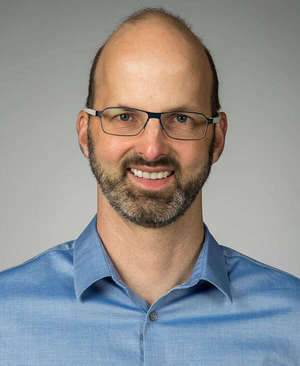
'The core idea is that concepts have a special feature. One thing can be truly conceived in a variety of ways, even when the different ways of being conceived involve partially or wholly distinct contents. To take a familiar example, suppose being physical and being mental are two different natures or fundamental ways of being a thing. Descartes thought these two kinds of natures are so different that they are incompatible: if something is physical, it can’t be mental, and vice versa. Spinoza argues that if being physical and being mental are just two different ways of conceiving one and the same thing, then a spatially extended thing could also be thinking. In fact, Spinoza continues, if we accept Descartes’ claim that the physical and the mental are entirely conceptually distinct from each other, then insofar as being physical and being mental are just two ways of conceiving things, there couldn’t be any grounds for incompatibility between them. More generally, if the world’s diversity is conceptually structured in the right ways, then Spinoza will be able to show how such diversity is consistent with the various parsimonious identities that he also defends.'
'Read in light of the rest of Spinoza’s conceptualist machinery, this analysis of necessity has a surprising upshot. One and the same thing can exist necessarily and contingently, relative to different ways of being conceived. Neither modal status is true independently of how the thing is conceived, and neither is intrinsically truer. Just like one and the same thing for Spinoza is both thinking and extended, relative to different ways of conceiving it with respect to an attribute, so too one and the same thing is both necessary and contingent, relative to different ways of conceiving it with respect to its causes. And insofar as the essences of things have to do with their modal profiles, then things could also have different essences and essential properties, depending on how they are conceived.'
'Spinoza argues that we would actually lead better lives if we conceived of events and things as necessary, since we would possess greater psychological stability and be less susceptible to fear and regret. And part of the way to do that is to grasp more and more of the causal history of events, to see ourselves and our experiences in relation to the past, to nature, and to God. And he would surely think that the more we get in the habit of doing this – of conceiving things from a broader and more inclusive standpoint, as it were – the better equipped we are to continue doing it for future events. The stronger get stronger; mental and emotional stability begets more stability; a mind habituated to pursue science, metaphysics, and theology in the ways Spinoza commends is more apt and able to do so in the future.'
'I do think Spinoza accepts panpsychism, roughly the view that everything has mental properties. In Spinoza’s language, everything that exists can be truly conceived as thinking. This commitment follows from his explanatory naturalism, which we talked about earlier. If, in order to explain the activities of some things, such as humans or God, we must appeal to mental properties, then the explanations for the activities of all things must also appeal to mental properties.'
Sam Newlands' philosophical writing has centered on three overlapping areas: early modern philosophy, metaphysics, and philosophy of religion. Here he discusses the new wave of interest in Spinoza, his explanatory naturalism, his monism, his conceptualist strategy, concept sensitivity, conceptual identification, his ideas about modality, conceptual pluralism, the link between his conceptualist metaphysics and his 'practical privileging', the role of moral transformation, our interests and their relation to metaphysical commitments, why his ethical egoism coupled with his concept-sensitive metaphysics is a radical call to self-transcendence, idealism, panpsychism, and how harmonious are the the views of Spinoza and Leibniz. Finally he turns to the problem of evil and how early modern philosophy changed the plot.

3:16: What made you become a philosopher?
Sam Newlands: While I’ve always loved a good argument, it was never my plan to pursue a career in philosophy. I went to college expecting a rough and tumble career in journalism or politics, and I thought I already knew how to argue and what we should all be arguing about. My first philosophy class with Charles Lewis at Wake Forest University taught me that I knew neither of these things. I learned how intellectual curiosity wasn’t satisfied with cheap rhetorical tricks and debate-style point scoring, and that relevance and significance wasn’t always the same as urgent or trendy. Of course, I was totally at sea throughout most the course, but that was part of what captivated me about philosophy, that sense of how vast and deep and turbulent the intellectual waters were, how insignificant my own little thoughts were compared to that expanse of previous thinkers, and yet how satisfying it was to drink in as much as I could. Like the Athenian youth, I had been corrupted.
I went to graduate school knowing almost nothing about how the academy actually worked. I figured that philosophy professors sat around discussing Hegel all day. Fortunately, the Yale philosophy department was full of kind-hearted faculty who were willing to let me explore all manner of philosophical interests before settling down to specialize. One of the most significant lessons I learned there was that there need not be a deep divide between studying philosophy and studying its history. Indeed, there could be a significant benefit to pursuing both simultaneously. For me, that combination was early modern philosophy and contemporary metaphysics.
But more generally, I was fascinated by the recurring patterns in philosophical work, the way we keep bumping up against the same core problems and then circling back around similar solutions, none of which seem totally satisfying. I understand how that can be off-putting: we’ve been arguing about the same things for a couple thousand years?! But those cycles also offer a chance to participate in an intellectual project that began well before us and will hopefully continue long after. That instills a sense of humility and awe in me more than fatigue or despair.

3:16: You’re a leading figure in the renaissance of Spinoza studies. How do you explain this new wave of enthusiasm for Spinoza? Is he replacing Descartes as the go-to modern philosopher?
SN: Some Spinoza fandom might be driven by morbid curiosity. Spinoza was one of the most feared, vilified, and castigated figures in philosophical history. His works were widely condemned as “monstrous and abominable,” and entire generations of philosophers cut their intellectual teeth penning various “refutations of Spinoza.” One of his contemporaries got into trouble just for suggesting that Spinoza might have been a fairly decent human being (even though, this critic emphasized, he held views that “surpass all the monstrosities and chimerical disorders of the craziest people who were ever put away in lunatic asylums.”) Another contemporary dubbed him “the most dangerous man of the century,” which isn’t exactly a Time magazine cover, but it certainly piques interest. As any parent knows, forbidding something is a surefire way to make it more attractive, and all this condemnation of Spinoza guaranteed ongoing interest in his views. We naturally wonder, why all this vitriol for someone who led a pretty quiet personal life and whose personal motto was caute, “cautiously”?
The current Spinoza renaissance is a bit tamer, as we don’t face the same personal consequences for studying Spinoza as his first two centuries of readers faced. In 2006, there was even an off-Broadway play about Spinoza’s excommunication, and a NYT review described that Spinoza as “perky and adorable,” which I like to think of as the real Spinoza. Although there has been a lot of interest in Spinoza’s reception (including my own new project, No Cheating: A Spinozistic Reading of Early Modern Metaphysics…see how smoothly I worked that plug in? Feel free to cut), he also attracts interest because he was just a really good philosopher. He offers sharp, engaging, and creative arguments for surprising conclusions, he addresses fundamental problems in nearly every domain of philosophy, and he offers readers a distinctive way to live the good life. What’s not to like?
Even though the interest in all-things-Spinoza shows no signs of slowing, I doubt that he will surpass Descartes as the “go-to” modern philosopher, as you put it, if only because he borrows so much of his framing from Descartes and because his writing style is much more austere and demanding than Descartes’. But unlike Descartes, Spinoza is friendly to forms of naturalism that are very widespread today, so if someone is looking for a modern philosopher who shares some basic contemporary orientations while still offering distinctive challenges and alternatives, Spinoza is a fantastic choice.
3:16: You say that his philosophy is underwritten by what you call his ‘explanatory naturalism.’ So to begin, what is this kind of naturalism – is it linked to his Principle of Sufficient reason - and why is it so enormously important to understanding him?
SN: Well, having just said that he’s friendly to contemporary forms of naturalism, there is actually one kind of naturalism that he endorses – what I call explanatory naturalism – that is at odds with some contemporary views. Spinoza thinks everything is explicable, and he tries to avoid explanations that end with a brute fact: “well, that’s just the way it is.” The expectation that everything is explicable is sometimes called the Principle of Sufficient Reason, and I think Spinoza reasons in accordance with this principle even for really abstract matters in metaphysics, including for metaphysical explanations themselves. Spinoza also puts a constraint on what counts as an acceptable explanation. For example, he thinks proper explanations must be universal in scope. Everything plays by the same rules, as it were. Proper explanations do not admit of exception classes.
So, for instance, if basic physical laws explain the structure and behavior of rocks, then those same laws must also explain the structure and behavior of humans. Humans are not special or exceptional in the explanatory order of the universe, some kind of “kingdom within a kingdom,” in Spinoza’s words. That direction is less controversial these days, but Spinoza applies it in the other direction too. So if having mental states also explains the structure and activity of humans and God, so too must having mental states explain the fundamental nature and activity of trees and rocks. There will be differences in complexity and degree among the things being explained by such physical and mental laws, but there is no difference in the scope of such explanations. The combination of these two explanatory demands together – everything is explicable and must be explained using the same principles – is what I call Spinoza’s explanatory naturalism.
Explanatory naturalism is a very demanding view, and it prompts Spinoza to seek out laws or principles that might satisfy it. He thinks he found them, and one way to evaluate his philosophical system is to consider whether his explanations really do satisfy his own explanatory demands. Correspondingly, it provides a litmus test for competing interpretations of Spinoza, at least if we want to be charitable: do they offer explanations that apply widely and without exceptions?
3:16: Spinoza is a monist –so how does he account for the world’s diversity given his commitments to maximal ontological parsimony and plenitude?
SN: That’s the million dollar question facing Spinoza’s metaphysics, in my opinion. On the one hand, he’s got the instincts of a grand unifier who loves a good identity thesis. That’s his parsimonious side: there exists only one substance, a mind and its body is “one and the same thing,” power and virtue are identical, etc. At the same time, Spinoza also has the heart of a multiplier. Within that one substance, there is an incredible diversity of fundamental natures, essences, individuals, powers, and relations – way more diversity than most non-monists are willing to accept! That’s his plentitude side. But how can so much diversity be consistently realized within a single fundamental substance?
Spinoza actually wrote a short dialogue exploring this question. As a literary device, it is terrible. The main characters have names like “Reason” and “Understanding.” Still, it raises an important philosophical question that he knew he needed to answer. The troublemaker Lust wryly notes, “It would be marvelous indeed if this should turn out to be consistent: that Unity agrees with the Diversity I see everywhere in Nature. But how could this be?” How indeed? Lust has put his finger on one of the most significant challenges facing any serious monist like Spinoza. How can a single substance contain so much diversity without sacrificing its internal unity? Can Spinoza really affirm both the One and the Many? Even sympathetic interpreters have concluded “no,” and they disagree just over what Spinoza sacrifices. Maybe he’s not really a substance monist, after all; maybe the One is really just some kind of collection of the Many. Or perhaps the apparent diversity in the world is merely apparent, and the putative Many somehow collapses back into an undifferentiated One.
I understand both of these instincts, but maybe we’ve overlooked or undervalued something. What if Spinoza has not only a brazen vision for both parsimony and plentitude, but also a philosophical toolset to pull it off? In essence, that’s what I explore in my book Reconceiving Spinoza . What sort of philosophical machinery does Spinoza use to defend his bold, perhaps reckless insistence that he can have it all? My main answer is what I call Spinoza’s conceptualist strategy .
3:16: Ok, so what is Spinoza’s conceptualist strategy? Why are conceptual relations crucial for Spinoza and why haven’t they been very prominent in previous readers have they?
SN: The core idea is that concepts have a special feature. One thing can be truly conceived in a variety of ways, even when the different ways of being conceived involve partially or wholly distinct contents. To take a familiar example, suppose being physical and being mental are two different natures or fundamental ways of being a thing. Descartes thought these two kinds of natures are so different that they are incompatible: if something is physical, it can’t be mental, and vice versa. Spinoza argues that if being physical and being mental are just two different ways of conceiving one and the same thing, then a spatially extended thing could also be thinking. In fact, Spinoza continues, if we accept Descartes’ claim that the physical and the mental are entirely conceptually distinct from each other, then insofar as being physical and being mental are just two ways of conceiving things, there couldn’t be any grounds for incompatibility between them. More generally, if the world’s diversity is conceptually structured in the right ways, then Spinoza will be able to show how such diversity is consistent with the various parsimonious identities that he also defends.
I’m sure that sounds super abstract, and so I spend the first two chapters of the book laying out the details and motivations of this strategy, including Spinoza’s case that attributes like being physical and being mental are just ways of conceiving things. The next four chapters explore its implications for other parts of Spinoza’s metaphysics, including his account of metaphysical dependence, of necessity/contingency, of essences, and of individuation. The back half of the book then explores how Spinoza’s conceptualist metaphysics underwrites some of his ethics, and how his ethics, it turn, completes his metaphysics. Not for nothing is Spinoza considered a systematic philosopher!
I’m definitely not the first to notice the outsized role that conceptual relations play in Spinoza’s philosophy, but I think his appeals to the conceptual are more widespread and systematic than even conceptual-heavy interpreters have appreciated. And I can see why many other interpreters have downplayed or elided Spinoza’s appeals to conceptual relations altogether. I mean, maybe he’s just a bad writer. When Spinoza refers to “the wise man, insofar as he is considered as such,” maybe that’s just a clunky way of referring to the wise man. Some have also worried that over-emphasizing the conceptual in Spinoza leads to bad interpretative consequences, such as idealism. So the burden is definitely on me to show that his ubiquitous appeals to the conceptual aren’t so idle or disastrous.
3:16: Why does Spinoza think that causal and modal structures are concept sensitive and how does this link with what you call the notion of conceptual identification?
SN: These are good places to see conceptual relations doing real and important work for Spinoza. I mentioned the physical/mental distinction above. Spinoza famously claims that mental things (minds) can’t cause physical changes and that physical things (bodies) can’t cause mental changes. He also claims that every mind is identical to some body and that every mind and every body is causally active. But if my body causes some physical changes and if my body is identical to my mind, how can my mind cause no physical changes? With some basic substitutions, doesn’t it follow that my mind both does and does not cause physical changes?
Spinoza rejects this inference by rejecting the underlying view of causation. We typically think that whether one thing causes another doesn’t depend on how the things are conceived. Causation seems like a concept-independent matter. We might use concepts to make causal ascriptions or to specify causally relevant features, but those guises do not seem to be parts of the world’s causal structure. Spinoza denies this and argues that causal facts are partly sensitive to how the things involved in causation are conceived. If a thing, conceived in one way, is a cause of another, it doesn’t always follow that the very same thing, conceived in a different way, is the cause. In the mind-body case, Spinoza argues that even if a body causes only physical changes, it doesn’t follow that everything identical to that body causes physical changes. Whether a thing causes something depends, in part, on how the things involved are conceived.
I argue that Spinoza makes the same sort of move about necessity and contingency. For example, we typically don’t treat whether a thing exists necessarily or not as in any way dependent on how that thing is conceived. But, I argue, Spinoza claims that whether a thing exists necessarily or not does partly depend on how it is conceived. Conceived in certain ways, a thing exists necessarily; conceived in other ways, it exists contingently. Like causation, modality is concept sensitive for Spinoza.Those are contentious and perhaps even counter-intuitive views of causation and modality. So how does Spinoza defend them?
As your question hinted at, I think Spinoza defends conceptual sensitivity with an even bolder thesis of conceptual identification . The reason why causal facts are sensitive to how things are conceived is because causal relations just are conceptual relations, for Spinoza. The reason why modality is concept sensitive is because necessary connections just are conceptual connections. In other words, behind Spinoza’s surprising conceptual sensitivity claims are identity claims that, if true, would justify all the conceptual sensitivity. Maybe that just pushes the bump in the carpet back a bit – ok, why should we accept Spinoza’s conceptual identification claims? That’s an even longer story, one that turns on his account of God, perfection, and metaphysical explanation more generally. And here we see why working on Spinoza can be so hard (but also fun!): making progress in one domain usually requires making parallel progress in a bunch of other domains. I really admire systematic philosophers, but they sure make interpretative life hellish.
3:16: What’s conceptual dependence monism?
SN: It’s definitely a mouthful of a label, so let’s stick with the abbreviation, CDM. We can think of CDM as an extreme version of what I was just talking about. CDM is the view that all forms of metaphysical dependence, including causal and modal dependence, are just conceptual containment relations. What it is for one thing to cause or necessitate another is just for the concept of the latter to be contained in the concept of the former. Spinoza holds a similar view, I argue, for other, seemingly distinct forms of dependence, such as inherence, existing in virtue of, and following from. That again sounds super abstract, but I think CDM is one possible answer to a really rich and important metaphysical question. A long-standing goal in metaphysics is to grasp and explain the structure of reality, where structure often involves dependence.
For example, we might try to explain mental states like beliefs and desires by trying to understand how they depend on more fundamental brain states. And maybe we try to explain those brain states in terms of how they depend on electro-chemical processes, which perhaps depend on more basic physical interactions, and so forth. Or, moving in a different direction, maybe we try to explain a given mental state by appealing to its particular mental and/or physical causes (“I desired to eat because of such-and-such physiological cues and such-and-such beliefs about eating”) or to more general causal influences, like evolutionary or social pressures. In all these cases, we’re trying to explain things by understanding what they depend on. Spinoza thinks the central project of metaphysics is to explain the world by discerning and articulating such dependence structures. But he thinks metaphysicians shouldn’t try to explain only how things depend on other things . They should also undercover how different kinds of dependence relate to and perhaps even depend upon one another.
In my toy examples, I gestured at two kinds of explanations for a mental state. One was in terms of its underlying physical structure and the other in terms of its causal history. What is the relationship between these two kinds of dependence, ontic vs causal? Are they just two different kinds of dependence? Is one more basic or fundamental than the other? Can causation and ontic dependence themselves be explained in terms of some further form of dependence? In pursuing answers to such questions, we are trying to explain the explainers. Spinoza’s demand that dependence relations themselves be explained is just a consequence of his explanatory naturalism, and he warns that failing to do this properly leaves us vulnerable to making metaphysical mistakes in trying to explain things.
We can see this ambitious project at work in the very opening of Spinoza’s Ethics. He defines his basic categories of things (substances, modes, attribute) in terms of their dependence relations. Some things inhere in others, some don’t; some things are conceived through others, some things are caused by others, etc. But he also tries to explain how these different forms of dependence relate to each other. Indeed, his opening definition isn’t about a thing at all – it’s a definition of a form of causation in terms of another form of dependence, namely conceptual containment . Since he thinks metaphysical explanation proceeds by articulating dependence, and since he begins by articulating how dependence relations depend on each other, Spinoza in effect begins his metaphysics by explaining what it is to successfully explain, by prioritizing the prioritizing relations. Rationalist charm at its best.
CDM is one very austere account of how seemingly different forms of dependence relate to each other, and I argue that Spinoza defends it: all dependence is conceptual dependence. I also argue that CDM underwrites Spinoza’s confidence that this metaphysical project is viable for us in the first place. Because he thinks that conceptual relations are in principle perspicuous to us and the metaphysical relations between things are all instances of conceptual dependence, he believes that the metaphysical project of explaining things through their dependence structures is open to us. Believe it or not, debates about CDM and its alternatives have become one of the hottest topics in analytic Spinoza studies these days, though CDM is definitely in the minority (alas). From the outside, this kind of interpretative debate can seem ultra-narrow, a dispute reserved for hardcore Spinoza nerds. But I’ve tried to suggest here that it actually tracks Spinoza’s deepest metaphysical ambitions. And Spinoza is hardly alone in this interest. In the last 30 years, there has been a lot of contemporary work on parallel issues, such as whether structural dependence is a purely modal form of dependence or whether there is a single, unified grounding relation. I think this is one of those places where the Spinoza community and analytic metaphysics community have shared interests and can learn from each other’s work.

3:16: What’s modality according to Spinoza and what difference does this have on how we should understand his theory of essences?
SN: From one interpretive landmine to the next! One of Spinoza’s most well-known claims is that nothing is contingent. We might now say: everything that happens, happens necessarily and everything that fails to happen is impossible. The Allies couldn’t have lost WWII; Joe Biden necessarily won the 2020 US election. This view is known as necessitarianism , and it is one of the least popular views in the history of philosophy. As Spinoza’s own correspondent pointed out to him, necessitarianism seems to imply fatalism, which appears to undermine almost all moral and religious practices. How can we be held responsible for anything we do if we couldn’t – in the strongest sense of that term – have done otherwise? Might as well blame the numbers two and three for adding up to five. For centuries, Spinoza was rebuked for his necessitarianism. However, in the last 50 years, two surprising developments on this topic happened.
First, interpreters like Ed Curley began asking, did Spinoza really embrace such an outrageous view? Although Spinoza says some pretty straightforward things in favor of necessitarianism, there are other texts that seem to pull in non-necessitarian directions. Second, contemporary metaphysicians, freed from their positivist shackles and supported by advances in modal logic, became incredibly interested in modality. During the 1970s, there was an explosion of work in modal metaphysics that relied on technical frameworks like possible world semantics. These two developments together came together in the 80s and 90s, and there was a groundswell of new work on Spinoza’s views on necessity, contingency, and possibility. Much of this work centered on what I call the question of modal distribution : which things or events are necessary, which are contingent, and so forth. There were lots of interpretative debates that involved some really subtle textual work...all of which appeared to change nobody’s mind, and the topic began to peter out. But perhaps focusing so much on the distribution question obscured a prior question. Just what is necessity and contingency, according to Spinoza? I call this the analysis of modality question. Perhaps if we could make progress on the analysis question, we might shed fresh light on the distribution question. What would be really great is if answering the analysis question also predicted and explained the whole debate over the distribution question. Can we explain why some of Spinoza’s texts on necessity and contingency seem less straightforward than we might have expected, and why the main interpretative battle lines were drawn in the way they were?
I think we can do all of this, and I’ve already tipped my hand as to how. I argue that necessity, for Spinoza, just is a conceptual containment relation. The details get complicated, but the basic idea is that something necessarily exists insofar as it exists and is conceived through the concepts of its causes, at least one of which itself necessarily exists. (And let’s just say that something exists contingently insofar as it exists non-necessarily.) Read in light of the rest of Spinoza’s conceptualist machinery, this analysis of necessity has a surprising upshot. One and the same thing can exist necessarily and contingently, relative to different ways of being conceived. Neither modal status is true independently of how the thing is conceived, and neither is intrinsically truer. Just like one and the same thing for Spinoza is both thinking and extended, relative to different ways of conceiving it with respect to an attribute, so too one and the same thing is both necessary and contingent, relative to different ways of conceiving it with respect to its causes. And insofar as the essences of things have to do with their modal profiles, then things could also have different essences and essential properties, depending on how they are conceived.
There’s a lot of contentious claims involved in all that, but one nice upshot is that it does predict the interpretative and textual debates on modal distribution. For it turns out that both the necessitarian and non-necessitarian readings are correct, but only partially so. Spinoza affirms both, and he does so consistently (contra a third camp that claims he was just modally confused) with his conceptualist analysis of modality. Independent of Spinoza, that conceptualist analysis of modality was deeply unpopular during the modal revolution of the 1970s and 80s. It has a lot in common with so-called anti-essentialist and conventionalist theories of modality, which were exactly the accounts of modality that leading modal essentialists like Kripke and Plantinga were working to overcome. In the wake of their incredible successes, it isn’t surprising that interpreters read Spinoza through a similar modal essentialist lens and that this generated an interpretative mess. But, in yet another happy convergence of history and today, there has been growing dissatisfaction in contemporary metaphysics with Kripke-style modal orthodoxy, and fresh analyses of modality have again received attention, includes ones that have a lot in common with Spinoza’s own account.
3:16: What’s conceptual pluralism and what makes it problematic when paired with conceptual identification – and how does Spinoza deal with this?
SN: Let’s stick with the example of modality. I said that according to Spinoza, the modal status of a thing depends partly on how it is conceived. Conceived in one way, my coffee cup exists necessarily; conceived in a different way, it exists contingently. I called that conceptual sensitivity . But conceptual sensitivity by itself could turn out to be rather uninteresting. For if it turned out that there was only one true, modally relevant way of conceiving the coffee cup (say, the one according to which the cup exists necessarily), then the fact that the cup exists contingently when conceived falsely is not very interesting. But if conceptual sensitivity is paired with the claim that there is more than one true, modally relevant way of conceiving the cup, then the view has some teeth again. That addition is what I call conceptual pluralism : there are multiple, salient and equally true ways of conceiving things. When conceptual sensitivity is combined in the right ways with conceptual pluralism, it follows that the modal status of things varies, depending on how it is conceived. I call this result an instance of conceptual variability .
The genuine metaphysical features of things vary, depending on how the things are conceived. My modality reading is super controversial, so here’s a somewhat less controversial example in Spinoza. Spinoza explicitly claims that whether a thing causes mental or physical effects depends partly on how it is conceived in relation to an attribute or fundamental nature. But if there was only one fundamental way of being – as physicalists or idealists claim – then the attribute sensitivity of causation wouldn’t make a difference. It is only when we combine attribute sensitivity with attribute pluralism that we get the striking result that the mental vs physical causal structures of things can vary, depending on how they are conceived with respect to their attributes. This is only the tip of the pluralist iceberg. It turns out that there are infinitely many different, salient, and true ways of conceiving things for Spinoza, both across and within attributes, and so the range of his conceptual pluralism is mind-boggling vast. I think there are both textual and philosophical grounds for attributing such a vast conceptual pluralism to Spinoza.
But combining conceptual pluralism and sensitivity like this raises independent worries. It starts to make the metaphysical features of things seem kind of mushy. We want to know which is the real modal status of things – are they necessary or not? Is human nature really physical or mental? Replying that, well, uh, in a way, both , depending on how things are conceived, seems to dodge the hard question by invoking a murky metaphysical relativism. Now, there’s a sense in which my account definitely commits Spinoza to a form of metaphysical relativism, if by that we just mean that some features of things genuinely vary, relative to different concepts of them. That’s just the view. But that doesn’t imply that anything goes. “ Hey, conceived as a Martian, I’m from Mars; therefore what planet I’m from depends on how I’m conceived! ” Just because there are multiple true and salient ways of conceiving things, it doesn’t follow that there aren’t false and confused ways of conceiving things or that some features of things are not concept sensitive. And Spinoza works hard to direct readers away from confused and inadequate conceptions of the world towards truer and more adequate ones. But if Spinoza is right, there is a real plurality of equally true and adequate ways of conceiving things, even as there are also plenty of false and confusing ones.
3:16: What’s the link between Spinoza’s conceptualist metaphysics and what you call practical privileging? Does he think that some ways of conceiving the word are better for us to adopt even if that advantage is not based on better truth-tracking?
SN: Now we’re wading into even deeper waters. Suppose we accept the pluralism I just laid out, according to which there are many equally true and salient ways of conceiving things. Suppose we also accept the conceptual variability I mentioned, according to which some of the metaphysical features of things vary, relative to some of these different, equally true ways of conceiving things. Things have both mental and physical causal structures, things exist necessarily and contingently, and so forth. (Again, we’re also keeping in mind the qualifications and machinery I mentioned that keep these pairings consistent.) In light of all that, how should I try to conceive the world and my place in it? Pursuing true conceptions of the world and avoiding false conceptions will allow me to make cognitive and explanatory progress, according to Spinoza. But as we have now seen, pursuing truth alone won’t yield a single answer; we’re going to get a lot of “both”s (or worse, given the vast range of conceptual pluralism.)
In some cases, Spinoza is fine with this parity. He thinks trying to explain the world only in terms of physical events will leave off the equally true and equally fundamental world of mental phenomena. So if we’re trying to explain the fundamental causal structures of the world or trying to understand what kinds of things we are, we shouldn’t privilege physicalist conceptions of things over mentalistic conceptions or vice versa. We should seek to explain all things in both physical and mental categories.But in other cases of variability, Spinoza thinks we ought to pursue some true ways of conceiving things over other true ways. For example, he claims that we ought to try to grasp concepts of things which imply that things exist necessarily. In this sense, necessitarian accounts of the world are better than their non-necessitarian counterparts. Again, that’s not because the former are truer or exclusively represent the real modal status of things. There are true accounts of the world according to which things exist contingently, for Spinoza. So why privilege some necessitarian accounts over some non-necessitarian accounts? Why not let a thousand modal flowers bloom?
Spinoza’s answer bridges his conceptualist metaphysics with his ethics. Our practical interests provide sufficient reasons for us to grasp some true ways of conceiving things over other true ways. Because we can more reliably satisfy our practical interests by conceiving things as necessary, Spinoza urges his readers to do so. In this sense, it is better for us to conceive things in certain true ways over others. Spinoza’s own account of our practical interests is broadly desire-based and egoistic. Our interests center on satisfying our most basic desire, and every individual’s most basic desire is to survive and accrue greater power for themselves. Of course, Spinoza argues that his ethical egoism is consistent with all manner of other-regarding pursuits, like justice, fairness, honesty, and so forth. I myself find those arguments and his underlying account of our practical interests deeply problematic. So I’m not a fan of Spinoza’s actual moral theory, at least as I understand it. But we can abstract away from the details and appreciate his more general idea that an agent’s practical interests can provide her sufficient reasons for privileging some ways of conceiving the world and herself over others, even within the kind of pluralist metaphysics Spinoza offers.
3:16: Does Spinoza think that moral transformation allows us to adopt broader ways of conceiving the world?
SN: I like the way you put that question. I’ve been talking about moving in the other direction. We have moral motivations (in Spinoza’s sense of that term) to adopt broader, or more causally inclusive, ways of conceiving the world over other narrower ways. It is better for us to grasp more and more of the causal history of things. But you’re asking whether our moral improvement (again, in Spinoza’s sense) might also give us some of the resources to do what we are morally motivated to do. Almost like a moral muscle – the more we pursue our self-interests in this way, the better we get at satisfying them. Spinoza grounds our self-interests in what he argues is a universal and necessary striving for perseverance and power. But he thinks we are often confused about this. Either we falsely believe that our deepest self-interest lies elsewhere (such as in appeasing the gods) or we hold false beliefs about how to reliably satisfy our fundamental desire (such as by accumulating wealth or prestige). A significant goal of his moral project is to equip his readers to better understand their real motivational structure and the most reliable means for satisfying what they naturally seek.
So, to use the example of modality again, Spinoza argues that we would actually lead better lives if we conceived of events and things as necessary, since we would possess greater psychological stability and be less susceptible to fear and regret. And part of the way to do that is to grasp more and more of the causal history of events, to see ourselves and our experiences in relation to the past, to nature, and to God. And he would surely think that the more we get in the habit of doing this – of conceiving things from a broader and more inclusive standpoint, as it were – the better equipped we are to continue doing it for future events. The stronger get stronger; mental and emotional stability begets more stability; a mind habituated to pursue science, metaphysics, and theology in the ways Spinoza commends is more apt and able to do so in the future.
I hate to end on a downer note, but it is worth flagging that although Spinoza holds out the possibility for such improvements, he is also pretty pessimistic that we’ll get very far. He thinks our cognitive capacities are limited and our desire to persevere is ultimately thwarted (death is coming!). So although there are ways of conceiving the world that would free us from emotional bondage to fear and regret, we are unlikely to grasp them. Stability, freedom, satisfaction are all ripe for the taking, but most of us are unlikely to grasp these goods for long, if ever. This tragic undercurrent to the Ethics flows steadily alongside Spinoza’s more hopeful promises of blessedness and eternality. But Spinoza denies that our world is overseen by a benevolent caretaker with a special concern for us. Did we really expect a happy ending?
3:16: And does he think that our interests and even self-identity vary relative to our metaphysical commitments?
SN: I mentioned that Spinoza affirms a form of ethical egoism, even though he thinks agents still have sufficient moral reasons to pursue the interests of others. He offers a variety of familiar arguments for this, including prudential strategies (e.g., it is in my own self-interest for some of your interests to be satisfied) and adjustments to our putative desires (e.g., what is really in my individual self-interest is a shareable, non-exhaustive good like knowledge). These appeals target the <em>interest </em>in self-interest in order to try to make space for pursuing the interests of others.But Spinoza also floats a very different bridge from self to other-regard, one that targets the self in self-interest. This syncs up neatly with his conceptualist metaphysics. For suppose the very individuation of moral agents exhibits the same sort of conceptual variability that we’ve been discussing in other cases. Perhaps the boundary between mine and yours is less fixed and invariant than first meets the eye, in which case agents pursuing their self interest might not be as myopic and ethically questionable as it first appears.
I argue that Spinoza’s conceptualist machinery allows him to offer a coherent version of this strategy, which, if he’s right, would have startling implications for our understanding of agency, selves, and interpersonal ethics.
3:16: How does Spinoza’s distinctive account of selves prevent his action theory from collapsing into metaphysical incoherence and what do you mean when you say that his ethical egoism coupled with his concept-sensitive metaphysics is a radical call to self-transcendence?
SN: Just when it seemed like we had arrived at the upper stratosphere of metaphysical wildness, you ask this follow-up! Let’s back up a step to get a running start. Spinoza’s Ethics promises a path for sweeping personal transformations, from bondage to freedom, foolishness to wisdom, weakness to empowerment, fear to love, passivity to activity, even corruptibility to eternality. But Spinoza has been accused of neglecting or excluding various elements that seem central to any plausible account of human persons, such as finitude, subjectivity, qualia, and first-person perspectives. Indeed, Spinoza’s Ethics has sometimes been read as encouraging us to forget ourselves, or at least to forget those messier, subjective aspects of ourselves that do not readily conform to a neatly naturalized, strictly sub specie aeternitatis account of the world. On this reading, Spinoza is the paradigm of a hyper-objective, “view from nowhere” approach to philosophy that later philosophers like Kierkegaard and Nagel criticize.
I don’t agree with this general reading of Spinoza, and I think one way to push back is to consider his account of selves, which has been largely overlooked by interpreters. I claim that Spinoza offers an account that shares a lot in common with contemporary “Deep Self” theories that have been discussed by Harry Frankfurt, Gary Watson, Susan Wolf, Angela Smith, Chandra Sripada, and many others. And I argue that this account of selves explains otherwise puzzling, perhaps even incoherent aspects Spinoza’s accounts of agency, moral improvement and personal transformation. Boiled way, way down, the ethical goal of Spinozistic agents is empowerment, but this does not require agents to perform more or even different actions. Rather, Spinoza thinks empowerment can be achieved through reconceptualization. Agents are invited to conceive their actual actions, including past actions, differently. This process of re-appropriation not only promises psychic benefits like tranquility and stability, but can also change which states and actions belong to the agent, changing their very self-identity. There’s a lot of metaphysics needed to render all this coherent, and I think Spinoza’s conceptualism shows how it can be done. But his account of selves and ethical transformations also reminds us why all his conceptualist metaphysics matters in the end.

3:16: Why doesn’t all this concept-dependence turn Spinoza into an idealist – or at least a panpsychist?
SN: I do think Spinoza accepts panpsychism, roughly the view that everything has mental properties. In Spinoza’s language, everything that exists can be truly conceived as thinking. This commitment follows from his explanatory naturalism, which we talked about earlier. If, in order to explain the activities of some things, such as humans or God, we must appeal to mental properties, then the explanations for the activities of all things must also appeal to mental properties. Of course, the mental states of things like rocks and electrons will be far less complex than those of humans and will fall far short of being conscious and rational. So it might not be appropriate to describe electrons as having a full-blown mind , even if they have mental states. That still might sound pretty far out, but in yet another wonderful epicycle of philosophical history, panpsychism has again become a hot topic in contemporary philosophy of mind, and some argue that its fit with contemporary physics is one of its most attractive features.
Panpsychism makes an additive claim – everything has some mental properties. Idealism makes an exclusivist claim – everything is either a mind or a state of a mind. Spinoza rejects idealism and accepts a kind of parity and co-fundamentality between the mental and the physical. Everything has mental and physical properties, and being physical and being mental are irreducibly different ways of being a thing. This is one of the distinctive elements of Spinoza’s ontology. He accepts the universality and co-fundamentality of the physical and the mental, which is inconsistent with idealism. Still, it is worth keeping in mind that Spinoza used to be interpreted as an idealist (for more than a century!), and while I ultimately disagree with this reading, I think it is a more plausible interpretation than it is usually taken to be these days. But my own account of Spinoza’s project faces a real worry here. I’ve argued that the structure of the world for Spinoza is thoroughly and fundamentally conceptual. The relations among ways of being, among things, among properties, among moral agents, etc. are conceptually structured. But on the innocuous sounding assumption that conceptual relations are just mental relations, then my reading will have privileged mental relations in a way that is inconsistent with the anti-idealism parity and co-fundamentality I was just describing.
We seem left with a glum choice: should Spinoza have given up on the conceptual dependence or the mind independence of the bulk of his metaphysics and ethics? I’ve come to think this represents a false dichotomy, however. I think Spinoza rejects the “innocuous assumption” that conceptual relations are exclusively mental relations. Admittedly, teasing the mental – ideas, minds, and thinking – apart from the conceptual – concepts, conceptual containment, and conceiving – is difficult, but I try to show how Spinoza himself tries to do it and also how later philosophers, from Frege to Daniel Nolan, may provide resources for future Spinozists to affirm a concept-laden metaphysics and ethics and still avoid idealism.
3:16: And how would you summarise the harmony of Spinoza and Leibniz, his contemporary early modern rationalist?
SN: The relationship between Spinoza and Leibniz is philosophically rich and fascinating. They adopt very similar explanatory demands and metaphysical principles, but they seem to end up with radically opposed accounts of the world. How can there be such a divergence in outcome, given their shared starting points? This isn’t a purely academic question for me. I find my own philosophical views bouncing between these different poles, a more naturalistic and a more theistic form of metaphysical rationalism. I sometimes joke that at work by day, I am a Spinozist, but when I go home to the warm embrace of my family at night, I become a Leibnizian again. (Weekends and holidays are more fraught.) I’m mostly kidding, but I do feel the pull of both views. But maybe the distance between Spinoza and Leibniz isn’t as wide as it initially seems. Leibnizians have long been dogged by the accusation that they are cloaked Spinozists, and it has become fashionable these days to claim that Leibniz himself accepted certain forms of necessitarianism, for example. It is far less common to squeeze in the other direction, but I think Spinoza accepts more of what are often presented as distinctively Leibnizian claims.
For example, as I mentioned above, I think Spinoza allows room for contingency in the world, and the “harmony” line you mentioned refers to my attempt to show that Spinoza and Leibniz in fact accept the same underlying analysis of modality to reach the same both/and, necessitarianism and its denial, distribution accounts as well. I’ve made similar points about Spinoza’s views of perfection, which I think play a significant role in shaping his metaphysics, even though appeals to perfection is often thought to be a feature of Leibniz’s more theistic rationalism. This has made my Leibniz seem too Spinozistic to some, and my Spinoza seem too Leibnizian to others. But to me, that squeeze seems exactly right.
3:16: You’ve looked at how the early moderns approached the problem of evil. How do their discussions link up with contemporary discussions in the philosophy of religion?
SN: There’s a common narrative about the 17th century as the golden age for theodicies, a time when philosophers were given free rein to dream up novel explanations for the existence, amounts, and distributions of evil in a world allegedly created by a perfectly good, all-knowing and all-powerful God. It is often implied that such projects bloomed in a naïve vacuum that contemporary philosophers no longer accept. Ah, the good ole days of the 1600s, back when someone could take seriously the notion that ours was the best of all possible worlds, blissfully unaware of the critical clouds on the horizon: Voltaire, Hume, Schopenhauer, Nietzsche, Freud, et al.
I think this narrative is wrong at almost every point. Prominent early moderns were not woefully ignorant of hard data about evil or of ethical concerns that threaten to render their accounts inept, if not morally offensive. Nor were they especially novel and inventive in their explanations of God’s relation to evil, nearly all of which echo pre-modern theories. In fact, many of their most lasting contributions to discussions of the problem of evil lie in what the early moderns do not say, what they leave off from the traditions they inherited. For example, problems of evil are now usually pitched in epistemic and justificatory terms, such as whether facts about evil undermine the rationality of belief in God or whether the goods in our world could somehow justify the evils in it. Those are important questions, but theists were once also concerned about what I call the metaphysics of evil. What is the ontological status of evil, given the common monotheistic belief that God is wholly good and the most fundamental existent? What is the nature of God’s causal contributions to evil, given the theistic belief that God is closely involved in everything that happens? There was even a whole category of evil called “metaphysical evils” that is quite different from the contemporary schema of moral vs. natural evils. By the time of Hume’s Dialogues , problems of evil had been thinned out considerably. Hume’s criticisms of theistic accounts of evil are philosophy astute and justly influential, but his dialogues do not even include a spokesman for the theistic metaphysicians whose systematic accounts had been dominant for more than a millennium in the Latin West. Even Leibniz is reduced to a cheap punching bag, mentioned only in passing. What happened?
In the brisk movement from Descartes to Hume, the early moderns accomplished something quite stunning. They not only criticized and ridiculed pre-modern accounts of the metaphysics of evil (most especially the idea that evils are privations of goodness), they managed to erase from future discussions some of the very questions that those accounts were designed to answer. This early modern eclipse has been thorough and lasting, and I think it represents their greatest collective legacy for philosophical discussions of evil. In my opinion, this has not been a wholly salutary legacy, at least for theists, since the need for, say, compelling ontological and causal accounts of evil has not gone away, and neglecting these topics has led to misconstrual and distortions when problems of evil more familiar to us are discussed. This is one of those areas in which I think more historical awareness would lead to better philosophical exchanges, as looking back at our philosophical history helps us understand how and why our foci narrowed and lets us evaluate the merits of such shifts.
3:16: And finally are there five books that you can recommend to take us further into your philosophical world?
SN: Given the focus of our discussion, I suppose I should start with topical recommendations.
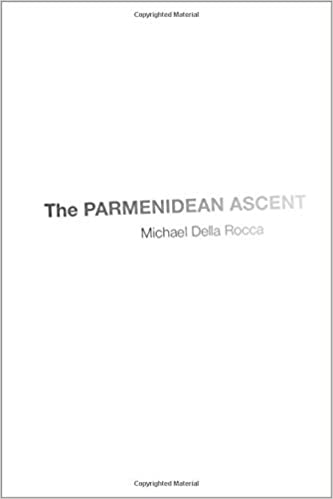
Michael Della Rocca has a new book, The Parmenidean Ascent, in which he draws inspiration from Spinoza’s explanatory demands to defend a form of radical monism in contemporary terms. His former Yale colleague, Robert Merrihew Adams, also has a new metaphysics book coming out, drawing inspiration from Leibniz and Kant to defend a form of idealistic panentheism. Both books are lively, cover a wide terrain, and powerfully defend surprising conclusions, to put it mildly.
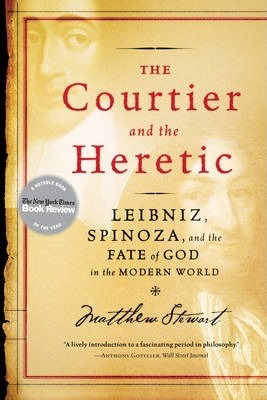
Although it is a little older, Matthew Stewart’s The Courtier and the Heretic is a gripping account of the historical relationship between Spinoza and Leibniz. Spoiler alert: Leibniz doesn’t come across as especially virtuous. Despite my affection for wild-eyed rationalists, I also harbor a secret love for existentialists. Their angsty brooding warms my heart during the long winters in South Bend.

On the side of the dead, Claire Carlisle’s new biography of Kierkegaard, Philosopher of the Heart , is as thought-provoking and quixotic as the great Dane himself.
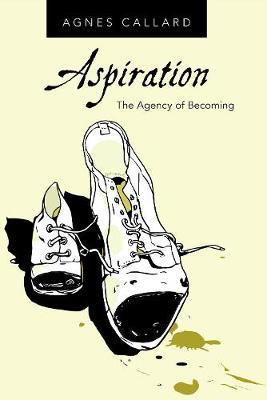
Among the living, Agnes Callard’s Aspiration is a rich reply to Laurie Paul’s
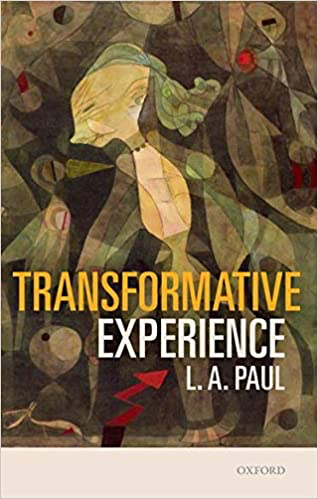
groundbreaking Transformative Experience – both of which I teach as contemporary extensions of existentialism (even though both authors recoiled slightly when I mentioned that framing to them).
I also like books by non-philosophers that remind philosophers that we’ve got some catching up to do. For example, I’ve been thinking and teaching lately about the pervasive role of digital technology in our lives, and I wish more professional philosophers were engaging this issue.
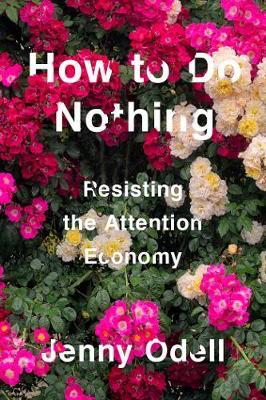
Jenny Odells’ How to Do Nothing is a meditative and thought-provoking call to a distinctive form of digital resistance. Her use of Melville’s “Bartleby, the Scrivner” is worth the price of the book alone.
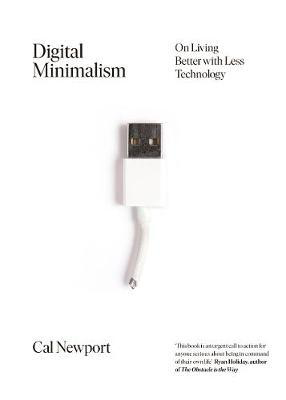
I’m also a big Cal Newport fan, and his Digital Minimalism has been a helpful guide.

I also fervently hope we will all read and implement his forthcoming A World without Email . Sounds like a lovely world to me.
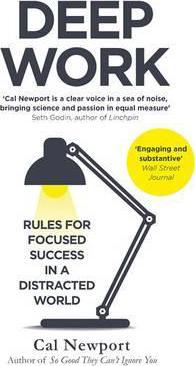
But if I’m dolling out general reading recommendations, Newport’s 2016 Deep Work remains the single best book I’ve ever read on how to create and sustain the mental space needed for philosophical reflection. I give copies of it to all my graduate students and I highly recommend it to your readers, whatever their professions.

ABOUT THE INTERVIEWER
Richard Marshall is biding his time.
Buy his second book here or his first book here to keep him biding!
End Time series: the themes
Huw Price's Flickering Shadows series.
Steven DeLay's Finding meaning series